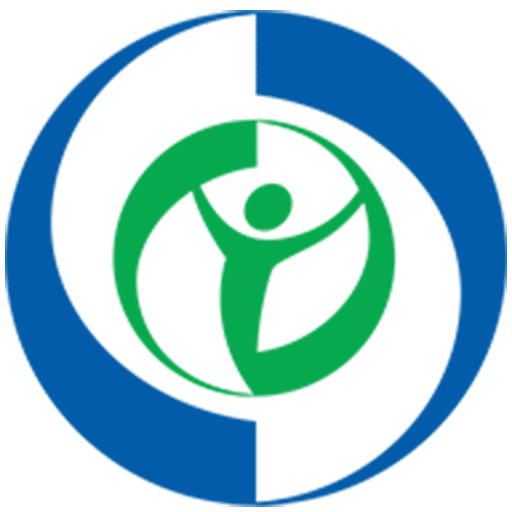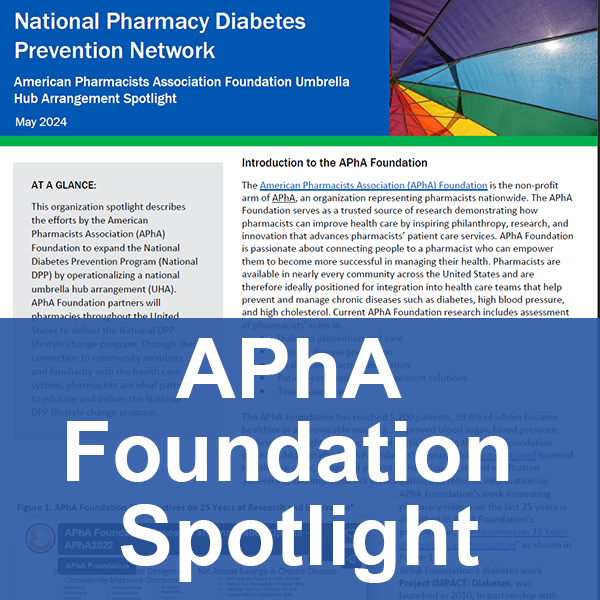Building Partnerships → Engaging Pharmacists
Engaging Pharmacists
Pharmacists can play a key role in scaling the National Diabetes Prevention Program (National DPP) lifestyle change program by promoting awareness of prediabetes, referring patients to the program, and becoming a CDC-recognized organization and delivering the program themselves. Through their work, pharmacists have frequent patient encounters. For some populations, such as Medicare beneficiaries, pharmacists often have significantly more encounters than patients have with their primary care providers. This was particularly true during the COVID-19 pandemic, when many traditional health care services were unavailable or over capacity, yet pharmacy services remained available. Pharmacists also have access to communities where clinical or community resources may be limited. Additionally, their experience in the preventive care field equips them with sufficient clinical knowledge and training to engage with National DPP lifestyle change program participants.
A 2018 study found that pharmacists were aware of the need for diabetes prevention and education services. The pharmacists also acknowledged that these services fit within their scope of practice, allowed for expanded community engagement, including wellness screenings, and built upon existing customer relationships between pharmacy staff and patients. Pharmacies are essential to the health care system and are increasingly interested in participating in opportunities to include patient care services among pharmacy offerings. However, researchers did note that both startup and long-term funding sources were important factors in ensuring sustainability of pharmacy preventative care services.
This page provides guidance and resources for state health departments and individuals interested in encouraging pharmacists to engage with the National DPP lifestyle change program. It also can be used by pharmacies interested in supporting and/or delivering the program. It is divided into the following sections:
- Resources for Educating and Engaging Pharmacists
- Examples of Pharmacies Involved in the National DPP Lifestyle Change Program
- Reimbursement for Pharmacies
Resources for Educating and Engaging Pharmacists
The CDC National DPP Customer Service Center has developed several resources to assist pharmacists in learning about and delivering the National DPP lifestyle change program, some of which are described below. A full list of CDC pharmacy resources is available here.
CDC Action Guide for Community Pharmacists
The Rx for the National Diabetes Prevention Program: Action Guide for Community Pharmacists was created by CDC, in collaboration with national pharmacy associations, to introduce pharmacy staff to the National DPP lifestyle change program and provide guidance on how they can support program delivery. The Action Guide is framed around “Three Tiers or Levels of Engagement” to allow users to tailor their support to the unique needs of their organization. The three tiers are:
- Promote Awareness of Prediabetes and the National DPP Lifestyle Change Program Among Patients at Risk: In this tier, pharmacy staff are encouraged to increase patient awareness of prediabetes risks and understand and disseminate supporting evidence for patient participation in the National DPP lifestyle change program. Pharmacy staff are also provided links to prediabetes educational and promotional materials developed by CDC and the American Medical Association (AMA) in both physical and digital formats.
- Screen, Test, Refer, and Enroll Patients: In tier two, pharmacy staff are trained on program eligibility criteria and how to screen patients using the CDC/American Diabetes Association (ADA) Prediabetes Risk Test. The Action Guide then provides information on referring eligible patients to enroll in the program. Additional information about referring patients to the National DPP lifestyle change program, including how referrals work and examples of referral strategies, is available on the Recruitment and Referral page.
- Offer the National DPP Lifestyle Change Program: In tier three, pharmacists are encouraged to become a CDC-recognized organization and offer the National DPP lifestyle change program in their pharmacy clinics. More information on applying for CDC recognition is available here. Tier three also provides pharmacists with information on the CDC Diabetes Prevention Recognition Program (DPRP) and Umbrella Hub Arrangements (UHAs).
The Action Guide also provides recommendations for how pharmacies can sustain their National DPP lifestyle change programs through program planning. This includes a table with detailed descriptions of the various roles members of the pharmacy workforce (such as pharmacists, residents, technicians, and students) can perform within each of the three tiers of engagement to maximize resource efficiency. There are also case studies, written by “early adopter” pharmacies, that provide insight around delivering the National DPP lifestyle change program in the pharmacy setting. Additional details for these case studies are provided in the Examples of Pharmacies Involved in the National DPP Lifestyle Change Program section below.
Additional Resources for Pharmacists
In conjunction with the Action Guide, CDC developed a Fight Type 2 Diabetes at Your Pharmacy Brochure, which provides a high level overview of how pharmacists can become involved with the National DPP lifestyle change program via the three tier structure.
Pharmacists engaging in the National DPP lifestyle change program can adapt the Pharmacy Health and Wellness Services Template to share their services with patients. Additionally, a series of short 1-2 minute videos making the business case for why a pharmacy would want to engage with the National DPP lifestyle change program are available below.
- Advance Your Pharmacy and Your Community Video
- Make an Impact at Your Pharmacy Video
- How Pharmacists Can Help Prevent Type 2 Diabetes Video
Diabetes Pharmacy Network
The Diabetes Pharmacy Network explores ways state health departments can work with pharmacists, pharmacy staff, and pharmacy schools to promote and implement both the National DPP lifestyle change program and Diabetes Self-Management Education and Support (DSMES). The Network assists pharmacy staff and schools seeking accreditation for offering DSMES and/or CDC recognition for the National DPP lifestyle change program. This collaboration also provides guidance and resources for pharmacies to offer and obtain reimbursement for the program, establish referral pathways, and identify and overcome barriers to implementation. In addition to hosting regular webinars, the Diabetes Pharmacy Network also has separate meetings specifically for pharmacies offering DSMES and/or the National DPP lifestyle change program, states working with pharmacy schools, and states working with pharmacies interested in increased clinical integration. For information about joining the Diabetes Pharmacy Network, please contact coveragetoolkit@chronicdisease.org.
Examples of Pharmacies Involved in the National DPP Lifestyle Change Program
Many pharmacies are already participating in the National DPP lifestyle change program. CDC’s National DPP Customer Service Center website includes a map of pharmacies that have CDC recognition. This map includes the precise locations of programs that have CDC recognition but does not include the locations of each affiliate organization that offers the program (i.e., if a pharmacy chain has achieved CDC recognition, it is likely only the location of the company’s headquarters will appear on the map, even though other affiliate locations may offer the program). State partners interested in increasing access to National DPP services should consider partnering with pharmacies to expand network capacity. More information on this topic is available on the Building Network Capacity page of the Coverage Toolkit.
CDC and NACDD have also partnered with several pharmacy organizations and networks offering the program through CDC funding and educational opportunities. Through 1815 and 1817 funding opportunities, state health departments developed strategies to increase pharmacy engagement in diabetes care and prevention, including DSMES and the National DPP lifestyle change program. Examples of those partnerships are located below.
American Pharmacists Association Foundation
The American Pharmacists Association (APhA) Foundation, the non-profit arm of APhA (an organization representing pharmacists nationwide) was one of CDC’s DP17-1705 recipients, a 5-year grant with a goal of scaling the National DPP lifestyle change program in underserved areas. In partnership with The Kroger Co. and Tabula Rasa Healthcare (TRHC), the APhA Foundation aimed to develop a network of pharmacies across the U.S. with the ability to educate, screen, test, and refer patients to the National DPP lifestyle change program. APhA Foundation developed an in-house platform which allows them to screen, test, refer, bill, and collect data for patients interested or participating in the National DPP lifestyle change program. For more information on the in-house platform, contact APhA
To further increase the scale of pharmacies involved in the National DPP lifestyle change program, APhA Foundation has also operationalized an umbrella hub arrangement (UHA), a business model that connects CDC-recognized organizations with health care payment systems to pursue sustainable reimbursement for the National DPP lifestyle change program and other services. In the UHA, APhA Foundation serves as the umbrella hub organization (UHO), which is the lead billing/administrative organization that can assist pharmacies in billing payers (particularly Medicare) for National DPP services. By engaging pharmacies as subsidiary organizations in the UHA, APhA Foundation can alleviate the necessity for pharmacies to develop complex billing processes and allow pharmacists/pharmacy technicians to focus on offering the National DPP lifestyle change program to patients. Review the APhA Foundation Spotlight for more information on APhA Foundation’s national pharmacy-focused UHA. For more information on the UHA model, visit the UHA Overview page of the Coverage Toolkit. Additional information on APHA’s National DPP pharmacy program is also available in Tier 2 of the CDC Action Guide for Community Pharmacists.
Virginia Commonwealth University
The CDC Action Guide for Community Pharmacists provides details on the Virginia Commonwealth University (VCU) Health Hub, which was created as an opportunity to provide healthy lifestyle education to individuals in low-income, food desert areas of Richmond, Virginia. VCU School of Pharmacy partnered with VCU Health Dietetic Internship Program to offer the National DPP lifestyle change program as part of the Health Hub offerings and includes services like nutrition counseling and physical education courses. To staff the program, VCU includes elements of the Lifestyle Coach training in their School of Pharmacy curriculum and is therefore able to certify pharmacy students as Lifestyle Coaches at the end of the semester. Thus far, VCU has trained over 300 Lifestyle Coaches and doubled participant retention through 1:1 student/participant pairing strategies. Additional information on VCU’s National DPP pharmacy program is available in Tier 3 of the CDC Action Guide for Community Pharmacists.
National Community Pharmacists Association
As part of the Innovations to Grow Enrollment and Retention (InGEAR) project, CDC has partnered with the National Community Pharmacists Association (NCPA) to train pharmacists how to implement and obtain reimbursement for the National DPP lifestyle change program. The project team is providing Lifestyle Coach training to pharmacy staff as well as training on how to utilize data collection and billing technology platforms. NCPA noted during a recent webinar that pharmacies participating in the InGEAR initiative were more likely to succeed in program implementation when they were able to develop partnerships with their local health departments, had experience with other patient care programs, and utilized various pharmacy staff positions in their program plans.
State Health Departments
Delaware
Delaware Department of Health and Social Services (DHHS) is actively working to recruit pharmacies into their UHA. DHHS is prioritizing engagement of community pharmacies that have established trust with their patients. DHSS’ UHA is convened by the Health Promotion Council, serving as the UHO.
Alabama
Alabama Public Health is actively working to engage pharmacy staff in their state to promote and offer the National DPP lifestyle change program. Through partnership with the Association of Diabetes Care and Education Specialists (ADCES), they are conducting a “Prescription for Prevention” webinar with pharmacists to encourage involvement in the program, as well as partnering with Samford University McWhorter School of Pharmacy to train pharmacists and dietitians to provide DSMES services and support in achieving National DPP Lifestyle Coach certification through the CDC.
Reimbursement for Pharmacies
One of the primary barriers to pharmacies offering the National DPP lifestyle change program is the cost associated with program training and startup. As such, pharmacies are encouraged to explore the various options for obtaining reimbursement and maximizing resources. For example, training pharmacy technicians, residents, or students (depending on allowable provider types in the state) to screen, test, and refer patients, or deliver the lifestlye change program can save costs and maximize efficiency. More information on this is available in the CDC Action Guide for Community Pharmacists described above.
In addition to grant funding, pharmacies may also explore reimbursement from multiple payer sources, including Medicaid, the Medicare Diabetes Prevention Program (MDPP), collaborative practice agreements (CPAs) with health care organizations, state and local health departments, and community groups, and/or contracts with Medicaid managed care organizations (MCOs), Medicare Advantage, commercial payers, or employers. This graphic, developed by NACDD, provides an overview of potential reimbursement and staffing options for diabetes-focused services that can be offered by pharmacies.
Pharmacies seeking reimbursement for delivery of the National DPP lifestyle change program can also consult the Considerations for Purchasing Technology Platforms to Support CDC-Funded Strategies Related to the National DPP, Diabetes Self-Management Education and Support (DSMES), and Pharmacists for guidance in purchasing billing, delivery, or pharmacy care plan platforms. More information on reimbursement options is provided below.
MDPP
Reimbursement for the National DPP lifestyle change program is available for CDC-recognized organizations enrolled as MDPP suppliers. To learn more about enrolling as an MDPP supplier, see the MDPP Basics page of the Coverage Toolkit. Some aditional considerations for pharmacies interested in enrolling as an MDPP supplier may include ensuring that the pharmacy has an existing Pharmacy Provider Transaction Access Number (PTAN) before enrolling as an MDPP supplier. A PTAN is a Medicare-only number issued by Medicare Administrative Coordinator (MACs) upon enrollment to Medicare.
Collaborative Practice Agreements (CPA)
A CPA is a formal agreement in which a licensed provider diagnoses and refers patients to a pharmacist who can perform specific patient care functions. A CPA is another method through which pharmacists can partner with health care providers to coordinate care management of patients. Though this traditionally includes options for pharmacists to adjust medication therapies and/or order and interpret laboratory tests, CPAs can also be drafted to include certain chronic care management functions. Of note, laws regarding the execution of CPAs and regulation of pharmacist scopes vary from state to state. CDC has developed two resources to assist with pharmacy knowledge and execution of CPAs. These include Collaborative Practice Agreements and Pharmacists’ Patient Care Services and Advancing Team-Based Care Through Collaborative Practice Agreements: A Resource and Implementation Guide for Adding Pharmacists to the Care Team.
Payer Contracting
Pharmacies likely have existing relationships with and knowledge of the payer landscape in their area, due to regular interactions through their existing roles. They are encouraged to explore which payers currently reimburse for National DPP services and/or explore additional opportunities to establish payment pathways. State health departments may also play an important role in facilitating relationships between local payers and pharmacies to establish reimbursment partnerships. Pharmacies can find state Mediciad agencies, commercial plans, and public/private employers that are covering the National DPP lifestyle change program on the Participating Payers and Employers page of the Coverage Toolkit. Additionally, resources related to contracting with MCOs are available on the MCO Contracting page.










